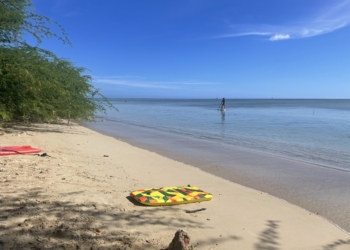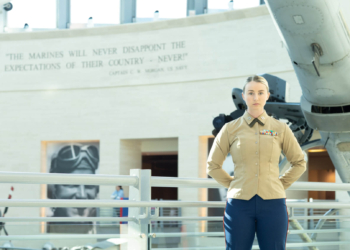Anyone who is not currently an adult didn’t know a life before 9/11. They didn’t know what a “real” New York City skyline looked like. I look back at who I was in 2001 — Jennifer Marie O’Reilly — when I conducted this interview with my father, Rich O’Reilly, and I remember feeling helpless and relieved yet filled with gratitude in equal measure.
I wrote the article below 18 years ago, give or take. My reporting was in its infancy, as was I. The subject matter was more weighty and personal than I will likely ever cover as a reporter again. Yet I stand by the content.
Today attention spans must be grabbed faster. Today, cell phones and video clips tell a story. We let words do that then. Here are my words.
Where I was
According to President Bush, it was an “act of war.” To the Channel 11 News team, “the darkest day in American history.” On 9/11, clichés were tossed about like Frisbees. These words are empty because there truly are no words. September 11th changed our country and all generations. Every generation has one. The “Baby boomer” generation had Kennedy. We — millennials — have 9/11.
A moment no one can shake. A moment there are no words for; a “Where were you when?” moment. That sucker punches you where it hurts the most. When something that could never happen to you, does.
Tuesday, Sept. 11, 2001, I woke up, braided my hair in pigtails, and dragged myself to my 9:30 a.m. “Approaches to Literature” class at The College of New Jersey. We read poems, tried to find our own meaning, not thinking of what the authors intended. I even wrote a poem about butterflies. Not even knowing.

“The building twisted,” my dad remembered. “It didn’t shake or sway, it twisted. We heard that a plane had crashed into our building [World Trade Center 1], so we started to evacuate. My team [office] and I stopped on the 30th floor. At that time we thought that some poor bastard had a heart attack in a smaller non-commercial plane. We made our phone calls, and by that time the aftershocks had stopped. There was smoke in the stairwell, but on the 30th floor everything seemed okay. I called my girlfriend and told her that a plane had hit and that we were being evacuated. And for a few minutes I considered waiting it out, until the fire had been put out. But then I looked out the window and saw cars on fire in a nearby parking lot and then I saw bodies lying on the roof of the Marriott Hotel. Something was wrong. I called my office over and we got in a different stairwell and refugeed the hell outta there. As I think about it now, I must’ve passed 50 or so walking-dead in the stairwell.”
At 10:50 a.m., my class finally let out and I was hungry. I strolled over to the Student Center. About a hundred people or so surrounded two televisions one near the info desk and the other by the bookstore. I asked a friend what celebrity was having sex with whom.
President Bush had addressed the nation. What did I care what he had to say? “He never says anything that matters,” I thought. But something happened to the World Trade Center. My mind blanked and I asked if that was the one with the two towers? I always got that confused with the Empire State Building. It was.
“Which one was hit?”
“Both.”
“Oh my God, oh my God.” I felt as though I was supposed to be crying, like I should make myself. My dad worked there, but I guess it hadn’t hit me yet.
I ran to a payphone and couldn’t even remember my dad’s number, let alone my calling card code. One of my friends, Holly or Robin — I don’t remember who — got my phone list from my planner. I frantically tried to dial numbers. I kept hitting all the wrong keys and mixing up numbers. My stomach, no longer hungry, twisted.
Daddy.
They carried me to make calls from my friend’s dorm. I don’t even remember walking. I put my friend’s hands on my back, guiding my way. But I don’t remember. I don’t remember calling. We passed people on cell phones, with loved ones, saying “Thank God.”
I wanted to “Thank God.” I remembered God.

I began to pray in my mind. “Please, please. Not him.” The phones didn’t work. I needed to leave. I needed to go. Anywhere. Do something. “I’m going home.” Toothbrush, purse, deodorant, black dress, underwear. My mind was nowhere. On my way over to my dorm, professors asked if I was okay. My distant voice, muffled with tears, said “No.”
I no longer felt I had to cry, my body made me.
My head was throbbing; the worst pain I’ve ever felt. Then someone approached me from behind and I lost all sense of where “down” was. It was like her hand had power over my legs, because I think I was on the ground at one point. I don’t remember. She walked me to my room, where I had a message.
“Jen, daddy’s okay. He was on the 50th floor.”
I don’t think I’ve ever cried this way, ever. There weren’t many tears. I barely used one tissue, half a tissue at the most. Each tear, a memory.
“If this had happened a month ago I would be dead,” my dad said. “A month ago our office was on the 78th floor; I wouldn’t have made it out in time. As it is, I was only out of the building 7 or 8 minutes when it collapsed. At the time my team and I knew the second building had been hit and thought we were being bombed. We made our way to the ferry to Staten Island. I looked around at the men and women with me, some Irish, Italian, black, white, Christian, Jewish, Muslim, Arabs, it didn’t matter. There were people on that ferry, who had to have only been in our country a month, but I remember them saying, ‘Thank God they didn’t hit her’ [looking at the Statue of Liberty]. We were all Americans.”

The first train pulled into the Little Silver train station around 10:45 p.m. No Dad. Years passed, the second train screeched to a halt. No one saw him. Then his profile ran across the passenger car window. The bells started ringing, warning us to step back. “Stop the train!” He was too close. The conductors knew the worry in our eyes, and reopened the doors. A powdery white figure rushed up to the sanitation crew. They let him pass. They knew.
“I knew she loved me. She drove home from college that same day to see that I was okay. My 20-year-old daughter saw beyond the ash on my clothes, the possible asbestos, and sat on my lap falling asleep to the news.”
Now I could “Thank God.”
This act has brought this country unity. It has brought us unity, God, and a shortage of American flags. But will it last? Will Americans remember? Why they’re waiting 2 hours to board a plane. Or why we stand, take off our hats and sing to fabric. Will my generation replace the “greatest?”
Fighting in the sand, but no beachheads in sight.
Showing a united front, not falling apart, but uniting against the horror that slaps you when you’re dreaming about butterflies.
Read comments






































